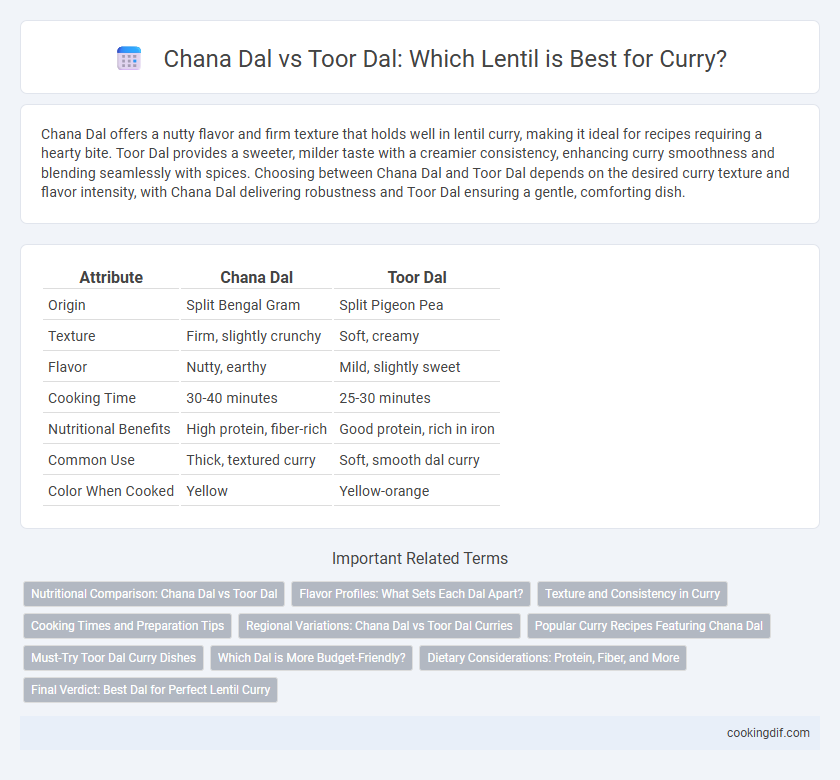Chana Dal offers a nutty flavor and firm texture that holds well in lentil curry, making it ideal for recipes requiring a hearty bite. Toor Dal provides a sweeter, milder taste with a creamier consistency, enhancing curry smoothness and blending seamlessly with spices. Choosing between Chana Dal and Toor Dal depends on the desired curry texture and flavor intensity, with Chana Dal delivering robustness and Toor Dal ensuring a gentle, comforting dish.
Table of Comparison
| Attribute | Chana Dal | Toor Dal |
|---|---|---|
| Origin | Split Bengal Gram | Split Pigeon Pea |
| Texture | Firm, slightly crunchy | Soft, creamy |
| Flavor | Nutty, earthy | Mild, slightly sweet |
| Cooking Time | 30-40 minutes | 25-30 minutes |
| Nutritional Benefits | High protein, fiber-rich | Good protein, rich in iron |
| Common Use | Thick, textured curry | Soft, smooth dal curry |
| Color When Cooked | Yellow | Yellow-orange |
Nutritional Comparison: Chana Dal vs Toor Dal
Chana Dal provides a higher protein content, approximately 21 grams per 100 grams, compared to Toor Dal's 22 grams, making it a robust source of plant-based protein. Toor Dal offers more dietary fiber, around 15 grams per 100 grams, which aids digestion and promotes gut health. Both dals are rich in essential minerals such as iron, potassium, and magnesium, but Chana Dal contains slightly more folate, important for cell function and tissue growth.
Flavor Profiles: What Sets Each Dal Apart?
Chana Dal offers a nutty, slightly sweet flavor with a firm texture that holds well in lentil curry, providing a rich, earthy base. Toor Dal has a mild, buttery taste with a soft, creamy consistency that blends seamlessly into sauces, enhancing the curry's smoothness. The distinct flavor profiles of Chana Dal and Toor Dal create unique culinary experiences, with Chana Dal delivering robust, textured bites and Toor Dal offering delicate, comforting richness.
Texture and Consistency in Curry
Chana Dal offers a firmer texture and holds its shape well in lentil curry, providing a slightly grainy, chewy consistency that enhances the dish's body. Toor Dal, on the other hand, breaks down more easily during cooking, resulting in a smoother, creamier curry with a thick, velvety consistency. Choosing between Chana Dal and Toor Dal depends on whether you prefer a chunkier curry with distinct lentil pieces or a more homogeneous, soft texture.
Cooking Times and Preparation Tips
Chana Dal typically requires a longer cooking time of 45-60 minutes, whereas Toor Dal cooks faster, usually within 20-30 minutes, making it suitable for quick lentil curries. Soaking Chana Dal for at least 30 minutes before cooking can significantly reduce its cooking time and improve texture. Toor Dal does not require soaking but benefits from thorough rinsing to remove impurities and ensure even cooking.
Regional Variations: Chana Dal vs Toor Dal Curries
Chana Dal is predominantly used in North Indian and Punjabi curries, offering a slightly nutty flavor and firm texture ideal for hearty, thick gravies. Toor Dal, also known as pigeon pea, is a staple in South Indian and Gujarati dishes, prized for its sweet, mild taste that blends well in sambar and thin, spiced broths. Regional variations highlight chana dal's use in robust, creamy preparations while toor dal is favored for lighter, tangy curries enriched with tamarind and mustard seeds.
Popular Curry Recipes Featuring Chana Dal
Chana dal is a staple ingredient in popular curry recipes such as Chana Dal Tadka and Chana Dal Fry, known for its slightly sweet and nutty flavor that enhances the dish's richness. Unlike Toor Dal, which is commonly used in South Indian sambar, Chana Dal provides a firmer texture and holds its shape well, making it ideal for thick, hearty curries. The high protein and fiber content in chana dal contributes to both flavor depth and nutritional value in these traditional Indian lentil curries.
Must-Try Toor Dal Curry Dishes
Toor dal, also known as pigeon peas, offers a rich, nutty flavor ideal for traditional lentil curries like Sambar and Toor Dal Tadka, delivering a creamy texture that absorbs spices well. This dal's high protein content and fiber make it a nutritious choice compared to chana dal, which is denser and sweeter with a firmer bite. Must-try toor dal curry dishes include South Indian Sambar, Gujarati Dal Dhokli, and Maharashtrian Usal, each showcasing its versatility and depth of flavor in regional cuisines.
Which Dal is More Budget-Friendly?
Chana dal is generally more budget-friendly than toor dal, making it a preferred choice for economical lentil curry recipes. Its availability in bulk and lower market price contribute to cost savings without compromising on protein content or flavor. Toor dal, while slightly pricier, offers a richer aroma and softer texture but may impact overall meal costs for budget-conscious cooks.
Dietary Considerations: Protein, Fiber, and More
Chana dal offers higher protein content and a rich supply of dietary fiber compared to toor dal, making it a preferred choice for those seeking better muscle health and improved digestion. Toor dal provides essential nutrients like iron and folate, contributing to heart health and energy production. Selecting between these lentils depends on specific dietary goals, with chana dal favoring protein and fiber needs and toor dal supporting overall nutrient balance.
Final Verdict: Best Dal for Perfect Lentil Curry
Toor dal offers a rich, buttery flavor and smooth texture, making it ideal for traditional South Indian sambar and lentil curry. Chana dal provides a slightly nutty taste with a firmer bite, perfect for dishes requiring a distinct crunch and depth. For the quintessential, creamy lentil curry experience, toor dal is the best choice due to its balance of flavor, ease of cooking, and versatility in curry recipes.
Chana Dal vs Toor Dal for lentil curry Infographic

 cookingdif.com
cookingdif.com